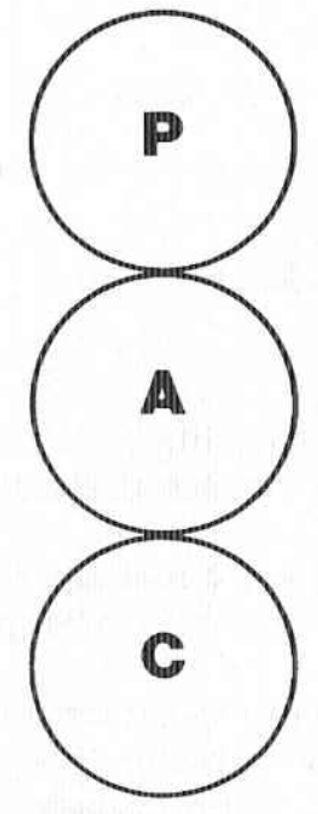An introduction to the Ego State Model of Transactional Analysis (Subscriber Bonus)
And how it helps our understanding of how we relate to ourselves and others
I fell in love with the Transactional Analysis model because it felt so relatable to me. I wonder if you will feel the same ? Please leave a comment below and subscribe for more content like this.
Fundamentally Transactional Analysis or TA is a theory for understanding personality, in particular of how people are structured psychologically.
The Ego State Model
The easiest way to do this is to use the PAC model, or what is known as the Ego State Model. Within TA, an Ego state is considered to be a set of related behaviours, thoughts and feelings (Joines 1987). The 3 ego states are Parent, Adult and Child.
Operating from our Parent ego state, we will behave in ways similar to the parental figures that were influential to us when growing up. This not only includes our parents, but anyone in a powerful position above us, e.g., teachers, coaches, priests, doctors, police officers etc. The messages given to us during our formative years, can last a lifetime. How many of us have said or done something and then realised it was just how a grown-up said it or behaved towards us when we were younger? That’s how easily it happens, often without us realising, or being conscious of it.
Now whilst some of these messages can be helpful and keep us safe, e.g., messages given about how to cross the road safely, some of the messages can be harmful and damage our sense of who we are, e.g., the child who is made to feel unimportant may carry those feelings into adulthood. Messages can be verbally expressed or non-verbally communicated, but felt all the same, so it is important to consider not only what was said to you, but how you felt around certain people when growing up.
In the Adult ego state, we are operating within the here and now, using all of our current knowledge to support decisions that we make. We can respond to what is going on in that moment and have awareness and connection to how we are thinking and feeling about a given situation.
In the Child ego state we may end up behaving in ways which are similar to those of our childhood. For example, becoming overwhelmed and dysregulated, we may hide and try to avoid what is happening or revert to ways of being that are younger than the age we actually are. For example the parent who is anxious of being “told off” when they are called to see the headmaster/ headmistress because of how their child has been behaving, or the employee who immediately thinks they have done something wrong if their boss asks to meet with them.
Transactions
When interreacting with others, we communicate through transactions and these can be analysed to identify which ego state each person is operating from. Ideally we would both be communicating from within our Adult ego state, but it is very easy to get drawn into operating from a Parent or Child ego state and then things can become more difficult.
Typically speaking organisations and systems in our life can take a very Parental role in how they support or challenge us, just consider the Police force, Social Care, Education for examples of these systemically parental structures within our society.
With this in mind, it might be helpful to keep in mind that someone communicating with us from their Parent ego state could invite us to respond from our Child ego state. Ideally we need powerful figures in our lives to recognise their power and work hard to minimise it, so that these power differences aren’t exploited and used against others.
In future pieces i’ll write about the different types of transactions and other elements of TA theory that help me make sense of being human.
References
Stewart, I., Joines, V., (1987) TA Today – A New Introduction to Transactional Analysis, Lifelong Publishing: Nottingham.
Kelly Taylor
(4 minutes)
.


